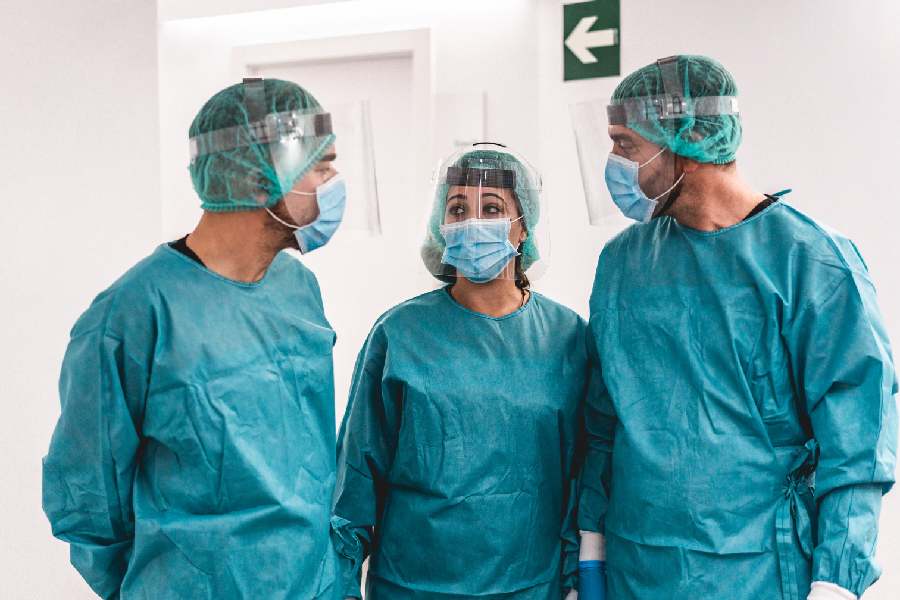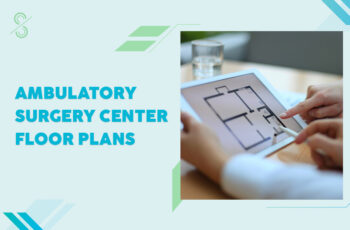What Is An Ambulatory Surgery Center?
The development of modern technology and techniques enables minimally invasive procedures to be performed in outpatient settings. Such procedures are more convenient, less stressful than inpatient ones, and available in ambulatory surgery centers. But what is an ambulatory surgery center? What is ASC in healthcare?
They are modern facilities that play a significant role in contemporary healthcare due to their contributions to the overall healthcare system.
If you are a medical professional looking to build your own ACS, keep reading this post to discover its benefits.
What Is An Ambulatory Surgery Center?
In general, surgeons perform outpatient surgery procedures in ASCs. But what does ambulatory surgery center mean?
An ambulatory surgery center (ASC) is a modern healthcare facility, specializing in providing outpatient surgical procedures. The ASCs are designed to perform procedures that don’t require overnight hospitalization.
The patients who choose to undergo surgery in such a facility arrive on the day of their procedure, have their surgery, and recover under the care of highly-skilled medical personnel without hospital admission.
ASCs are typically focused on performing elective surgeries that don’t involve life-threatening conditions. They are equipped with premium medical equipment and staffed by a team of healthcare professionals.
So, are ambulatory surgery centers considered hospitals? According to the Agency for Health Administration, ASCs are licensed standalone outpatient facilities that are not part of a hospital.
Advantages of Ambulatory Surgery Centers
Now that you are familiar with the definition of ambulatory surgery center, let’s proceed with the advantages these facilities can provide.
Lower expenses
Compared to traditional hospital settings, ASCs are known to be cost-effective. This is because they have lower overhead costs and administrative burdens.
Even though the expenses are lower, studies show the quality of care these facilities provide is equal to or better than that provided in hospital settings. ASCs have efficient workflows, leading to reduced patient healthcare expenses.
Safety
Outpatient surgery centers are believed to be safe as medical providers have more control over their work. They are also dedicated to cleanliness, minimizing the risk of healthcare-associated infections.
The patient’s health history is checked before surgery. By doing so, they may reduce the risk of surgical site infections and contagious diseases. One study found that outpatient surgical procedures were associated with lower rates of infections.
Enhanced patient experience
ASCs are focused on providing quality patient care in a comfortable setting. Patients here often experience shorter waiting times and personalized attention.
Hence, medical providers in these facilities have better control over the scheduling of surgeries. They may offer patients better pre and post-operative care.
ASCs aim to make the surgical experience more pleasant for the patients. Many patients feel less anxious when going home after surgery than in a hospital setting. So, outpatient surgery offers less discomfort and is less stressful than in-patient surgery.
Improved surgical outcomes
ASCs specialize in performing a wide range of outpatient procedures, from minor interventions to complex surgeries. The nature of such facilities allows specialized expertise, potentially leading to improved surgical outcomes and reduced complications.
In addition, ASCs typically may have lower infection rates due to their controlled environments and lower patient volumes. Such surgical facilities follow rigorous infection control protocols.
Quick recovery
In ASCs, patients undergo procedures and return home the same day, barring complications. Hence, such medical centers may promote faster recovery and offer comfort and convenience for the patients.
Accessibility
The ASCs are geographically dispersed, which makes their services easily accessible to patients. Such facilities cater to various specialties, ensuring patients conveniently access specialized care near their homes. They offer less time for scheduling procedures.
Alleviate hospital burden
Surgeons perform outpatient procedures in ASCs, enabling hospitals to focus on more critical and emergency cases.
These healthcare facilities provide alternative settings for less complex surgeries and free up hospital resources for patients needing inpatient care.
Innovation and advancement
ASCs are associated with technological advancements and innovations regarding anesthesia, surgical equipment, and techniques. Such specialized centers adopt new practices and technologies, which may lead to improved healthcare delivery.

Source: shutterstock.com/ Photo Contributor: DisobeyArt
Services and Specialties Offered in Ambulatory Surgery Centers
The ASCs cover a wide range of medical procedures and specialties. They are intended for patients that don’t require an overnight hospital stay.
While the services may vary depending on the specific facility, some common procedures are available in these centers.
General surgery
The ASCs offer various general surgical procedures such as appendectomies, hernia repairs, biopsies, and gallbladder removal.
Orthopedic surgery
These medical facilities specialize in orthopedic surgery, including toe, foot, ankle, and leg procedures. They cover procedures like arthroscopy, joint replacement, fracture repairs, and carpel tunnel release.
Ophthalmology
In these facilities, healthcare professionals perform a range of eye surgeries. They include cataract removal, LASIK, corneal transplant, and retinal repairs. Cataract surgery can also take place on an outpatient basis.
Gastroenterology
ASCs also provide procedures related to the digestive system. They include colonoscopies, endoscopies, hemorrhoidectomy, and gallbladder procedures.
Plastic surgery
The ASCs may perform cosmetic procedures such as breast augmentation and reduction, facelift and liposuction, and skin lesion removals. These healthcare facilities may also provide dermatology services like mole removal and others.
Gynecology
ASCs professionals offer gynecological procedures such as hysteroscopy, dilation, curettage, and tubal ligation. They also perform laparoscopic surgeries for conditions such as endometriosis and ovarian cysts.
Urology
Such healthcare facilities also offer urological procedures such as kidney stone removal, vasectomies, bladder surgeries, and prostate biopsies.
Pain management
The medical professionals working in ASCs may provide procedures for managing pain, such as epidural injections and nerve blocks. Other procedures they may provide include spinal cord stimulator placement and joint injections.
ENT
ASCs perform surgeries for the ear, nose, and throat. They include tonsillectomies, adenoidectomies, sinus surgeries, ear tube placements, and septoplasties.
Podiatry
The medical professionals in these healthcare centers specialize in foot and ankle surgeries like bunionectomy and hammertoe correction. Patients here may also access procedures such as Achilles tendon repairs and ingrown toenail removal.

Source: shutterstock.com/ Photo Contributor: Robert Przybysz
State-of-the-Art Facilities and Equipment in ASCs
As mentioned, ASCs have significantly evolved over the years. They have become state-of-the-art facilities equipped with advanced technology and specialized equipment for various procedures.
In continuation, find out which equipment is commonly found in such centers.
Operating room
In general, ASCs have multiple operating rooms with modern surgical infrastructure. The operating rooms are equipped with anesthesia machines and surgical lights.
They also have fully equipped sterile instrument sets. These rooms are designed to provide a sterile environment for a broad range of surgical procedures.
Endoscopy suites
Many ASCs have dedicated endoscopy suites with advanced equipment. They have high-definition video endoscopes, endoscopic ultrasound machines, narrow-band imaging technology, and specialized tools for various procedures.
Imaging technology
Many ASCs are equipped with advanced imaging technology. They feature fluoroscopy, digital radiography, ultrasound machines, and CT scanners. Such tools may aid in diagnosis, preoperative planning, and intraoperative procedure guidance.
Electronic medical records
ASCs utilize electronic medical records enabling healthcare workers to manage patient records efficiently. These systems also enable medical providers to track procedures and communicate with others. They may improve patient safety and care coordination.
Robotic surgical systems
Modern ASCs invest in robotic surgical systems that enable minimally invasive procedures with possible enhanced precision and control. These systems benefit surgeons, offering improved visualization and access to inaccessible areas. They may enable smaller incisions, reduced pain, and faster patient recovery.
Anesthesia monitoring
The state-of-the-art ASCs are equipped with advanced anesthesia monitoring systems. These medical professionals ensure patient safety and comfort during the procedure.
The systems enable anesthesia clinicians to monitor vital signs. These include blood pressure, heart rate, oxygen saturation, and anesthetic agent concentrations.
Sterilization and infection control
The advanced sterilization equipment on ASCs is designed to maintain high levels of infection control. It includes autoclaves for sterilizing surgical instruments, as well as ultrasonic cleaners.
The equipment enables adherence to standardized protocols for preventing infections.
Recovery rooms
These healthcare facilities have designated areas where medical professionals closely monitor patients after the surgery.
The recovery rooms have advanced patient monitoring systems. They include vital signs monitors, pulse oximeters, and cardiac telemetry to detect postoperative complications promptly.
Emergency preparedness plans
The ASCs have emergency preparedness plans such as emergency power generators and backup systems for handling medical emergencies.
The facilities adhere to safety protocols and measures that ensure they continue functioning and provide critical care during power outages and other unexpected events.

Source: shutterstock.com/ Photo Contributor: Robert Przybysz
Accreditation and Regulatory Standards for ASCs
An important thing to note is that ASCs are subject to accreditation and regulatory standards. This is to ensure patient safety and quality of care.
While specific standards and regulations may vary depending on region and jurisdiction, some common regulatory standards exist for such facilities.
In the US, the Accreditation Association for Ambulatory Health Care (AAAHC) and the Joint Commission (TJC) are prominent accrediting bodies for ASCs.
Licensing and certification
Each ambulatory surgery center must obtain appropriate licenses and certifications from relevant regulatory authorities in their jurisdiction.
They ensure compliance with specific regulations related to facility standards, infection control, safety protocols, and staff qualifications.
The medical providers must have the qualifications, appropriate medical training, and experience to perform the procedure.
Facility standards
If you are a healthcare professional planning on opening an ASC, it is essential to know that the facility must adhere to specific quality standards. This includes physical space, equipment, and safety measures.
The healthcare facility must also comply with building codes, fire safety regulations, accessibility guidelines, and infection control protocols.
Clinical standards
The ASC facility must also adhere to clinical standards focusing on patient care, surgical practices, and outcomes. They cover preoperative assessment, anesthesia administration, surgical techniques, patient monitoring, and postoperative care.
Medical management
ASCs must have policies and procedures for medical management like storage, medication administration, handling, and dispensing. They also must adhere to regulations related to controlled substances, proper documentation, and minimizing medical errors.
Infection control
These modern healthcare facilities are expected to implement comprehensive infection control measures. This is to prevent healthcare-associated infections.
Infection control measures include guidelines for sterilization, disinfection, hand hygiene, and aseptic techniques. Compliance with these standards is crucial for protecting patients and medical staff from infectious diseases.
Staff and credentials
The healthcare professionals working at ASCs must meet specific qualifications, credentials, and competency requirements. This involves verifying licenses and certifications, suitable training, and ongoing professional development.
Patient safety and privacy
ASCs are encouraged to establish quality improvement programs to monitor and improve patient safety and satisfaction. This includes collecting data, analyzing and implementing evidence-based practices to possibly improve the quality of care.
Medical providers must also protect patient privacy. They must adhere to legal and ethical standards related to patient rights, informed consent, confidentiality, and handling of personal health information.

Source: shutterstock.com/ Photo Contributor: Panchenko Vladimir
The Role of Healthcare Professionals in ASCs
Healthcare professionals play a crucial role in providing quality patient care. Here are some roles and responsibilities of healthcare professionals working in an ambulatory surgical center.
Surgeon
The surgeon is a qualified healthcare professional responsible for performing the actual surgical procedures in the ASC. They lead the operation and manage the medical team present in the operation room.
The surgeon works closely with the patient to diagnose the condition and determines whether the patient needs surgery. Then, the surgeon develops a treatment plan and provides post-operative care.
Anesthesiologist
The anesthesiologist administers anesthesia to patients during surgical procedures. They assess the patient’s medical history and evaluate their overall health.
Based on the evaluation results, the anesthesiologist determines the appropriate anesthesia type and dosage. They monitor the patient’s vital signs throughout the surgery and manage pain and sedation.
Nurse anesthetics
In some ASCs, registered nurse anesthetics work alongside anesthesiologists during surgery to administer anesthesia and monitor patients.
As healthcare providers with specialized training, they collaborate with the surgical team and ensure patient safety and comfort.
Registered nurse
The RNs provide comprehensive patient care during the surgical process. They assist with patient admission and perform pre-operative assessment. They also inform the patients about the procedure and the post-operative care.
The RNs assist the surgeon and anesthesiologist throughout surgery and monitor the patient’s condition. They ensure patient safety and comfort. RNs may also provide post-operative care, such as wound care and medication administration.
Surgical technologist
Surgical technologists play a crucial role during surgery. The operating room technicians are responsible for preparing the operating room, as well as for sterilizing instruments and assisting the surgical teams during procedures.
They maintain a sterile environment and ensure all the necessary equipment and supplies are available. They also handle instruments handed by the surgeon.
Support staff
ASCs must also employ support staff such as medical assistants and administrative personnel who assist in non-medical tasks.
They handle patient scheduling, manage patient records, do billing, and perform other administrative duties to ensure the smooth functioning of the center.

Source: shutterstock.com/ Photo Contributor: Panchenko Vladimir
Patient Experience in ASCs
Preoperative procedures are designed to ensure the patient is ready to undergo surgery. Since ASCs provide same-day surgical care, the patients are admitted and discharged on the same day.
Days before the surgery, the patients provide the necessary paperwork. They may also be asked to undergo certain tests before the procedure.
Read on to discover how the pre-operative procedure goes in ASC facilities.
1. Preoperative assessment
Before surgery, the patient undergoes a comprehensive assessment. This includes medical history review, physical examination, and diagnosis tests.
Doing so helps medical professionals identify any potential risks and complications that may occur during the surgical procedure.
2. Preoperative instructions
The patients receive specific instructions when it comes to preoperative preparation. These include guidelines on fasting (restricting food and fluid before surgery) and medication instructions (discontinuing certain medications before surgery).
Doing so is unnecessary for minor surgical procedures requiring only local anesthesia. The patients also receive instructions regarding hygiene practices (showering with an antibacterial the night before the surgery).
3. Preoperative testing
The medical providers may order diagnostic tests based on the patient’s medical history and the surgery. They include blood tests, ECG, chest X-ray, and urinalysis. The tests evaluate the patient’s overall health and ensure they can undergo surgery.
4. Medication management
The healthcare professional examines the patient’s current medications. They instruct the patients on which medications to stop or continue using before surgery.
Certain medications, such as anticoagulants, may need to be temporarily discontinued to minimize the risk of bleeding during surgery.
5. Anesthesia evaluation
Patients who need anesthesia before surgery must participate in an anesthesia evaluation. An anesthesiologist will review the patient’s medical history and discuss anesthesia plans based on the patient’s needs.
6. Informed consent
Before any surgery is performed, ASC ensures the patient provides informed consent. This involves discussing the procedure’s risks and benefits with the patient. The medical workers need to obtain signed consent from the patient.
State-of-the-art medical facilities such as ASCs often use preoperative checklists to complete all necessary preparations before surgery. They verify the patient’s identity and confirm the required consent forms are signed.
7. Preoperative preparations
On the day of the surgery, patients receive appropriate attire. IV lines may be inserted if necessary, and preoperative medications such as antibiotics and sedatives may be administered as medical professionals describe.
8. After surgery
Once the patients recover from anesthesia, they are discharged from the surgical center if their vital signs are stable.
The patients recover at home, and they are instructed to follow the recommendations provided by the surgeon. They are given medications for managing pain for the first few days after surgery.

Source: shutterstock.com/ Photo Contributor: Panchenko Vladimir
Cost and Insurance Considerations for ASCs
Cost
The cost of a surgical procedure in an ASC varies depending on multiple factors, such as location and type of procedure. The cost depends on the actual procedure and any additional required ambulatory surgical center services and supplies.
Patients need to consult a medical professional from the center to determine the estimate for a particular surgical procedure. However, the cost may be lower than surgical procedures in traditional hospital settings.
Insurance coverage
While most insurance plans cover procedures performed in ASCs, the coverage details may vary. Hence, patients must contact their insurance providers and review the policies to understand what procedures will be covered.
They also need to get informed of the extent of the coverage and any additional expenses they may need to cover. Some ASCs have contracts with specific insurance networks.
Conclusion
So, what is an ambulatory surgery center? If you have been wondering, we hope you were able to find all the necessary details regarding these healthcare facilities in this post. They offer cost-effective patient care with improved surgical outcomes and faster recovery.
By alleviating hospital burdens and providing high-quality healthcare services, such centers may contribute to more efficient healthcare. Such centers potentially benefit patients, medical providers, and the overall healthcare system.





